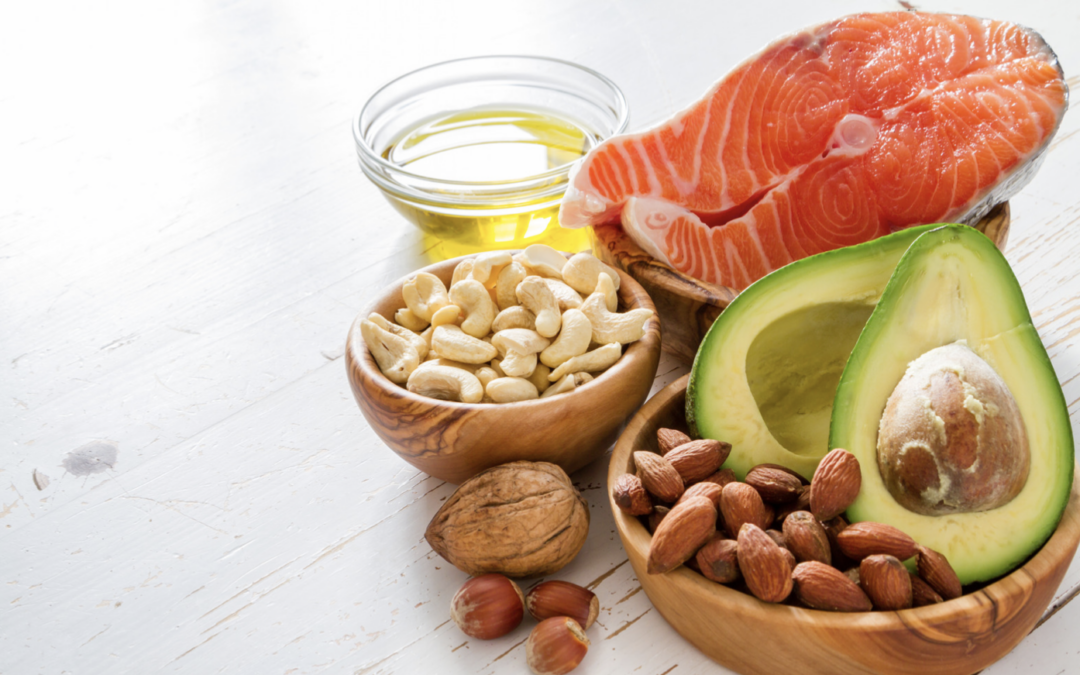For a long time, a diet low in fat has been proposed as the key to losing weight, managing cholesterol levels and even preventing various health conditions. However, the types of fat we eat matter more than the amount of fat. In other words: not all fats are bad. In fact, fats are an essential part of a balanced diet and whilst it is important to minimize the intake of unhealthy fats, it is equally as important to increase the intake of healthier fats.
Fat is an important part of our diet, playing a huge role in cellular function, hormone production, energy levels, mood, heart health, and nutrient absorption. Fats also slow down digestion and therefore make you feel more satisfied.
To break it down simply, you have 3 types of fat: unsaturated fats, saturated fats, and trans fats.
Types of Fat
Unsaturated fats are the ‘healthy’ fats and it’s important to include these as part of a healthy diet. They help to keep your cholesterol levels in the healthy range and play important roles throughout the body. Unsaturated fats provide essential fatty acids (omega-3s) that we can’t make in the body. They also help with the absorption of fat-soluble vitamins such as vitamins A, D, E and K.
Saturated fats increase the risk of various diseases if consumed in excess and are found in animal food products (cheese, milk, butter, fatty meats etc) and these foods should be enjoyed but limited in order to reduce our risk of heart disease.
Trans fats are factory-made fats, created to increase the shelf life of processed foods such as donuts, cakes, pastries, cakes, chips, chicken nuggets etc. These foods should be limited in the diet.
Enjoy healthy fats in small amounts each day by:
- cooking with healthy fats like extra virgin olive oil
- using unsaturated fats in place of saturated (for example, use avocado in place of butter in your sandwiches)
- eating fish and seafood at least twice a week
- snacking on nuts and adding them to your salads, muesli, roasted vegetables and stir-fry
- using nut and seed butter, like peanut, almond, and tahini
- using avocado in salads, and on toast for breakfast.
Fat Consumption and Mental Health
The brain is comprised of about 70% fat and requires omega-3s for normal development, functioning, and mood balance. Omega-3 fats, along with other healthy fatty acids, improve neurotransmitter activity, assist brain cells to communicate with each other, enhance brain-cell plasticity, and reduce inflammation. New research is also suggesting that omega-3 fats may reduce depression and other mood disorders.
Our bodies can’t make omega-3 fats meaning it’s important we include them in our diet. Foods that contain omega-3 fats include cold-water oily fish (salmon), grass-fed meats, flax seeds, chia seeds, and walnuts.
Neurotransmitters work throughout the brain, body, and digestive tract, acting as the chemical communication channel between neurons. These neurotransmitters are made from specific amino acids (building blocks of protein) that we can get from consuming a balanced diet full of vitamins, minerals, antioxidants, fatty acids (omega 3’s), carbohydrates and quality protein sources.
By giving our body the optimal environment to produce these neurotransmitters, we allow communication between neurons, gut bacteria and hormones to work as they should and support the health of our brains.
Fats and Hormone Production
Your body uses fats as the building block for hormone production hence why eating healthy fats, especially unsaturated fats, is vital for good hormone health and proper hormonal balance.
Fat intake is essential for hormone production and the maintenance of proper hormone function. Certain fats, such as those found in omega-3 fat sources, will aid in the rebuilding of cells and the stabilization of hormones.
For males, fat intake, in particular, omega-3 fatty acids may be positively associated with testicular function. For females, omega-3 can assist with balancing FSH levels, estrogen, progesterone and testosterone.
Overall, the best type of fat for optimum health is unsaturated fat and food sources of these include salmon, oily fish, avocado, extra virgin olive oil, walnuts, almonds, chia seeds and flax seeds. The best type of unsaturated (polyunsaturated) fat are those high in omega-3’s as these are proven to reduce cholesterol levels, improve mental well-being and reduce the risk of multiple chronic diseases.
If you’re looking for some healthy recipe inspiration? Check out Mandy’s eBook full of nourishing, easy, delicious, and nutritionist-approved recipes.
https://www.mandyhumphreysnutrition.com/product-page/real-food-recipe-ebook
Mandy has also kindly gifted the Beingwell community a special discount code.
Use the code ‘BEINGWELL’ for 20% off your purchase.


